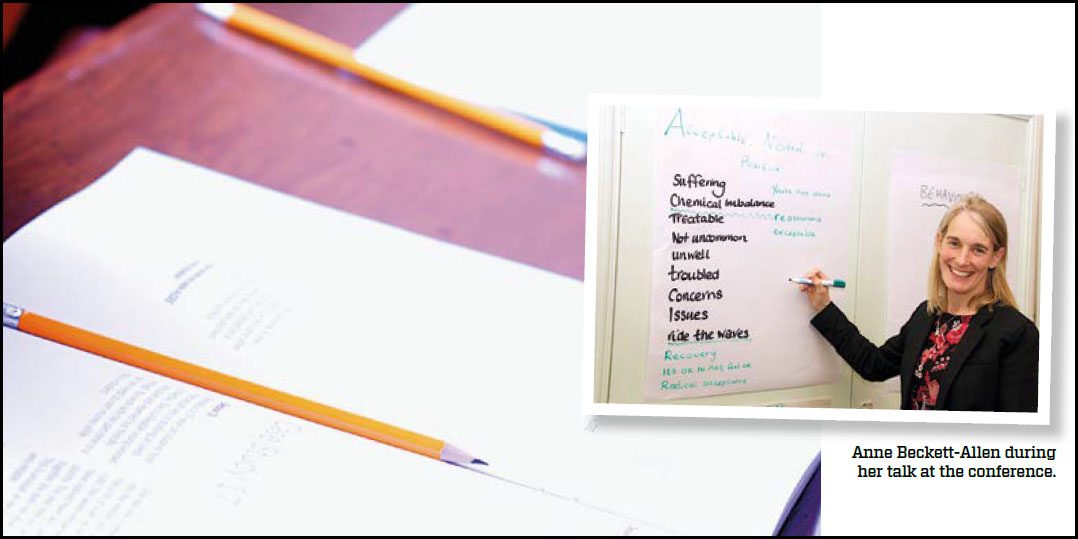A day of tears and smiles

Last month saw the first conference held by Rosedale Training and the University of East Anglia School of Anatomy. Understanding the impact of bereavement in our community attracted delegates from various professions and backgrounds to engaging Q&A sessions, with delegates hailing the day as ‘educational and enlightening’, ‘intense – lots of tears and smiles, too’ and ‘extremely beneficial’.
Copies of Help is at Hand and Finding the Words were distributed to all.
Speaker #1
Sue O’Connor, Senior Lecturer in Anatomy and Facility Manager at the University of East Anglia School of Anatomy
Topic The history of bequeathal and whole body donation. There were opportunities throughout the day for all delegates to have a guided tour of the Anatomy Department, and Sue’s particularly useful talk was interesting and informative for all.
Feedback “Oh, an amazing topic which I never thought I’d be able to sit through. Sue kept repeating how she ensures the dignity of the body at all times which is very reassuring. My mother wishes to donate her body to research so I now have the relevant information that she needs to make this happen. I expect most people think that they can just write it in their will and it will happen, but this is not the case.”
Speaker #2
Anne Becket-Allen, Rosedale Training
Topic Mental health first aid. Anne spoke of our vulnerability being shown by the size of our stress container and how we have to turn the tap on to release the overflow reinforcing the image that we can’t pour from an empty pot.
Mental health is the biggest cause of sickness and absenteeism from work, costing employers £34 billion a year and 75% of those with mental ill health receive no help. Staff in the funeral profession open themselves up to many risk factors for poor mental health, including long hours, night work, exposure to traumatic experiences and constantly giving of ourselves to support others.
Anne gave positive examples of how to develop health coping mechanisms and information on the benefits of about mental health first aid training.
Speaker #3
Christian Fairbrother, Funeral Director at Rosedale Funeral Home
Topic Christian shared his lived experience of suicide. A natural progression from mental health training is suicide prevention, and we know that people who are bereaved through suicide are more vulnerable to go on to die by suicide themselves.
Rosedale helped develop a training course for supporting those bereaved through suicide and are now working with Norfolk County Council, with the aim being for Norfolk to provide ‘Gold Standard Suicide Bereavement Training’.
Christian shared his thoughts and experiences of the time when his mother took her own life.
Feedback “Wow! Christian moved us all to tears not only for being strong enough to share his very personal experience with us but of the love and close bond he had with his wonderful mother.”
Speaker #4
Simon Barker, The Norwich and Waveney Mind Service, and Sarah Bates, the Executive Lead for Support and Suicide Partnership
Topic The language we should and shouldn’t use when talking about suicide. Simon and Sarah highlighted the different feelings the bereaved may have as a result of losing someone to suicide – it’s effectively “grief with the volume turned up”.
Feedback “It’s great that there is so much support for those living with the experience of a loved one taking their own life.”
Speaker #5 Duncan Green, Child Bereavement Support Worker at Nelson’s Journey.
Topic Child bereavement. Duncan read Terry Kettering’s poem Elephant in the Room which sums up bereavement and how folk find it difficult to talk about someone who has died. He emphasised that nothing that anyone says can make anything worse happen. He explained children’s understanding of bereavement at the different stages of their lives and outlined some shocking statistics:
- 1 in 29 schoolchildren are bereaved.
- 78% of 11-16 years olds are bereaved.
- 43% of 15-16 out of school are bereaved.
- Many GCSE failures are attributed to bereavement.
Deaths and loss have been identified as a risk of developing mental health problems especially if, after two years, a child feels less able to cope with change which may result in lower self-esteem than their peers.
Feedback “It’s so important to be truthful to children but especially regarding the death of a loved one, as difficult as it may be. This could be the trust that they need at a very vulnerable time and important for them trusting others in the future.”
Speaker #6
Lesley Bradfield and Lindsey Nettleton from Time Norfolk.
Topic Pregnancy and baby loss. The charity helps women making decisions through unplanned pregnancies, terminations, infertility issues, miscarriage, still births and perinatal anxiety. Clients can either be seen one-to-one or in small groups. They are either referred by the hospital, their midwife or a wellbeing group or make a self-referral. 1 in 4 pregnancies end in miscarriage and 1 in 225 are stillborn. The charity chose the term ‘time’ to emphasise time to listen, time to grieve and time to heal.
To find upcoming training and events, visit www. rosedaletraining.co.uk
Tags: aftercare, Anne Beckett-Allen, bereavement, community, conference, education, Finding the Words, Help is at Hand, Rosedale Funeral Home, Rosedale Training, Sarah Bates, suicide, Support After Suicide Partnership, training, University of East Anglia